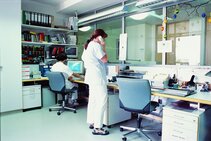Making an appointment
You can make an appointment for your visit with the following contacts:
Inpatient and outpatient appointments
Contact person: Mr.Olaf Gülck
Appointments: daily between 8am and 3pm
Phone number: 0761 / 270 - 53790
Fax: 0761 / 270 - 50240
E-mail: olaf.guelck@uniklinik-freiburg.de
Private outpatient appointments
Sekretariat Prof. Schulze-Bonhage
Contact person: Mrs. Larissa Sperandio
Apointments: daily between 8am and 3pm
Phone number: 0761 / 270 - 53660
Fax: 0761 / 270 - 50030
E-Mail: larissa.sperandio@uniklinik-freiburg.de
Outpatient appointments for children
central appointment allocation for neuropediatrics
Phone number: 0761 / 270 – 43 520
Monday-Friday: between 9am and 0:30pm
Monday, Tuesday, Thursday: between 1:30pm and 4pm
Inpatient appointments for children (Station Wartenberg)
Contact person: Mr. Olaf Gülck
Appointments: daily between 8am and 3pm
Phone number: 0761 / 270 - 53790
Fax: 0761 / 270 - 50240
E-mail: olaf.guelck@uniklinik-freiburg.de
In pediatric emergencies, doctors can approach the paediatric clinic's switchboard on 0761 / 270-43000.
After making an appointment by telephone, we ask you to send us the following documents in advance:
- Medical history sheets
- Doctor's letters and relevant findings (if possible)
- current MRI / CT images (digital files on CD), if applicable
On the day of the examination, registration takes place in the entrance area of the Neurocenter. A referral slip and the insurance card are required for this. From the registration desk you will be directed to the respective outpatient clinics.
The Epilepsy Center offers you comprehensive care for all matters relating to the disease epilepsy. The first step leads the patients to the outpatient clinic. Goals of the outpatient clinic are the treatment of patients with epilepsy and the diagnostic classification of patients with unclear disorders of consciousness.
As part of an appointment at the outpatient clinic, an EEG is performed and a detailed history is taken. The surface EEG and a blood sample are the first step, followed by a neurological examination by a specialist. In addition to the consultation, a patients are preselected for diagnostic measures. These determine whether an epilepsy is actually present, what form of epilepsy it is and, if necessary, whether surgery is possible and advisable. For this purpose, further necessary outpatient and inpatient appointments are arranged. Furthermore, the outpatient clinic is available for drug treatment and stimulation treatment and care before, during and after an operation. We are available to advise our patients and their relatives on all questions concerning everyday life with epilepsy
The outpatient appointment of children with epilepsy takes place in the rooms of the pediatric clinic with the option to use the facilities of the Social Pediatric Center, joining the patient´s benefit from the facilities of the pediatric clinic and the Epilepsy Centre.
Patients of the Epilepsy Center can also contact us twice a week by telephone and daily by e-mail. Information on this is provided under Contact.

On Station Wartenberg on the second floor of the Neurocenter, inpatient diagnostic and therapeutic measures for children and adults with epilepsies and related diseases are provided. In addition, perioperative care is provided in close cooperation with the neurosurgical team.
In particular we offer:
- Differential diagnostis to clarify whether epilepsy is present
- Presurgical evaluations to determine whether surgical treatment is a suitable option
- Monitoring to supervise the success of the treatment
- Complex treatments in a multidisciplinary team that includes medical doctors, psychologists, social workers, nutritionists, occupational therapists and physiotherapists
Flyer complex treatments
For handicapped patients and children, the admission of a caregiver is also offered according to availability.
Special aspects of video EEG monitoring
What is video EEG monitoring and what is it for?
Video EEG monitoring (V-EEG) means the simultaneous recording of an EEG ("brain waves") and a video. This examination can clarify whether suspicious events are epileptic seizures or consequences of other disorders. In the case of epileptic seizures, the V-EEG can provide additional information about the area of the brain, where the seizures originate. This information is necessary, if surgery to treat epilepsy is considered.
How does an examination with V-EEG work?
- At the beginning of the examination, electrodes are glued to the scalp with a medical adhesive ( Collodium ). They are later removed again with acetone. The number of electrodes depends on the exact diagnostic question and is determined by the doctor before the examination.
- After attaching the electrodes, you have to remain in or near the bed for the entire duration of the recording so that you are within range of the video camera. Only then can all seizures be recorded and precisely analysed. However, you can visit the bathroom and change clothes. To protect you from falling out of bed, we ask you to leave the padded bed rails up..
- In most cases, the anti-seizure medication is reduced or even completely discontinued for the duration of the V-EEG. We also ask some patients to undergo a so-called sleep deprivation (sleep reduction to 4 hours) to provoke seizures.
How long does an examination like this take and what can I do during this time?
- The time span ranges from a minimum of 48 hours to a maximum of 2 to 3 weeks. The exact length depends on the specific question and is determined by the physicians at the beginning of the examination, but can be adjusted depending on the results of the monitoring.
- During the examination you can watch TV, listen to the radio, read, work with or without a computer or surf on the Internet (WLAN available). You can use your own mobile phone or laptop, but only on battery power. Please bring devices with a good battery capacity or for example a power bank. You cannot use your technical devices while charging at a power outlet.
- Visits are possible every day at the usual times.
Are there risks and dangers during this examination?
The V-EEG with surface electrodes is a non- invasive examination with continuous surveillance by experienced staff oft he center. However, the following risks are associated:
- the incidence of so-called "major" or "grand mal" seizures can lead to muscle pain as well as injuries, such as tongue biting and very rarely to dislocations of the shoulder, or fractures of the vertebral bodies.
- Even if seizures only occur when medication is reduced, you are not allowed to drive a vehicle for at least 3 months afterwards.
- When epilepsy is diagnosed for the first time, you have to achieve seizure-freedom for at least 1 year before being allowed to drive again. Fof trucks, taxis and buses, the respective periods are much longer.
- Following the monitoring, drugs have to be re-introduced for proper protection; please consider the required time for this. There is a low risk that the efficacy is not identical as prior to reduction.
Which restrictions do I still have to consider?
- During the examination, you must remain in the monitoring room; during this time you are not allowee to smoke, drink alcohol or take drugs. E-cigarettes are also prohibited. We are happy to offer you a nicotine patch to prevent nicotine deprivation.
- Chewing gum is not allowed for safety reasons and due to disturbances in the EEG recording (muscle artefacts).
- You should be prepared to prolong the examination at the suggestion of the doctors if there have been no seizures or insuficient numbers or types of seizures, to reach the studies´ aims.
- Also plan time for the re-introduction of anti-seizure medication following the V-EEG, as you will need effective seizure protection when discharged.
- During the monitoring period you may use the toilet and bathroom, but do not take a shower.
- If the origin of epilepsy is suspected to be in the temporal lobe , the superficial electrodes on the head are often too far away to obtain good results. In this case, we suggest that you use a needle to insert a thin wired electrode ("sphenoidal electrode") in front of the jaw. The insertion can cause a short pain and possibly for a few days discomfort when chewing.
- During your visit you may also experience other patients having seizures.
- During your stay it may be necessary to change rooms. The nursing staff will be happy to assist you.
Good preparation is important - here we need your help!
- Please bring practical clothing with a wide head cut-out.
- We need to know whether you wear a pacemaker or an implantable cardioverter defibrillator (ICD), a vagus nerve or a deep brain stimulator, braces, a prosthesis (for example a hip joint) or a copper spiral for contraception. Please bring the implant ID card with you to the admission. If this information was not clarified in the outpatient consultation, please let us know before you are coming for monitoring.
- Please inform us if you have legal health custody.
- If you have no, or significantly fewer seizures than usual in the weeks prior to the planned monitoring, please let us know prior to the planned admission. (phone: +49 761 270-53790).
- For most patients we also perform neuropsychological testing. A good knowledge of German is necessary for this. Otherwise we need a professional translator in your mother language. Please draw our attention to this in advance.

- Epilepsy Center
Medical Director:
Prof. Dr. Schulze-Bonhage
Breisacher Str. 64
D-79106 Freiburg
Phone: +49 761 270 53660
Fax: +49 761 270 50030
epilepsiezentrum@uniklinik-freiburg.de
International Medical Service (IMS)
Robert-Koch-Str. 1
79106 Freiburg
Phone: +49 761 / 27 01 93 06 (English)
+49 761 / 27 08 4710 (по-русски)
Fax: +49 761 / 27 01 93 10
info-ims@uniklinik-freiburg.de
Internet: www.ims.uniklinik-freiburg.de
